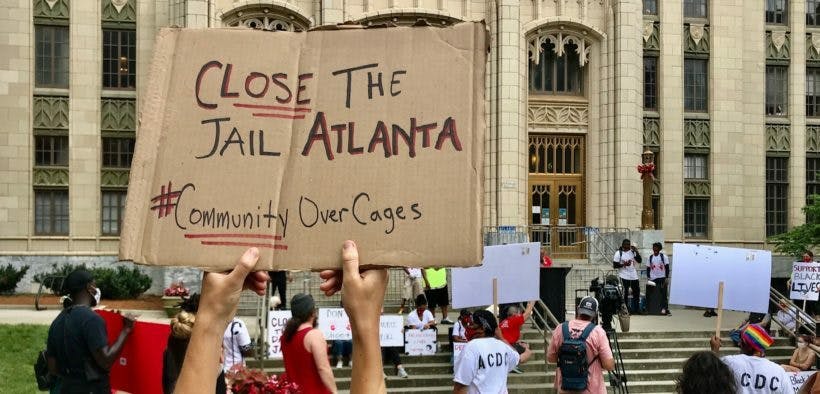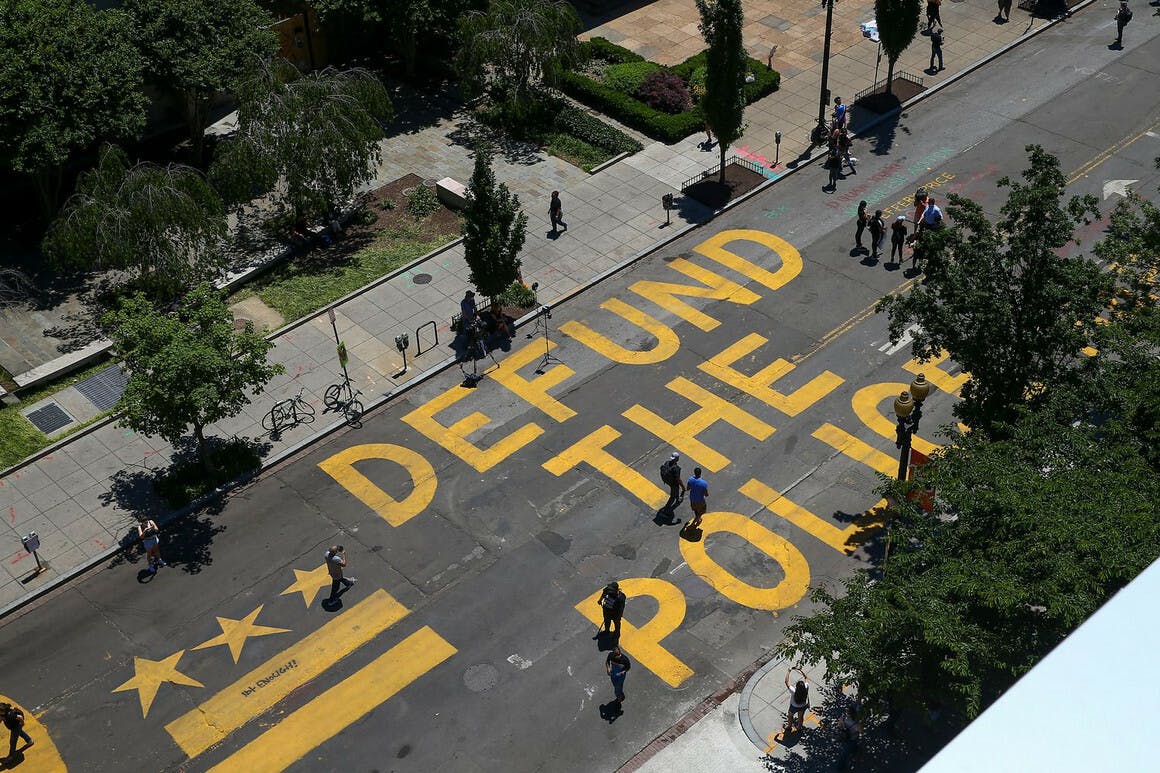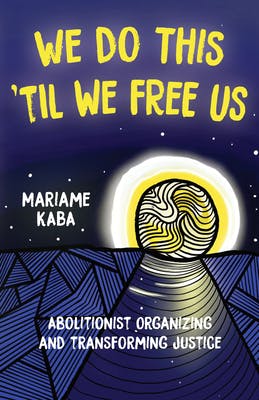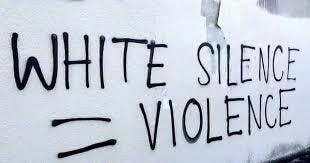Talking to my White kids about abolition
By Shannon Cofrin Gaggero

“Jails don’t keep us safe, neighbors do!” My 6 year old said on the message she left for Atlanta City Council a few weeks ago. Atlanta is at a critical inflection point in the campaign led by Women on the Rise and other coalition partners to close Atlanta’s city jail. While our mayor committed to repurposing the jail into a center for wellness and freedom, many members of our city council, thanks to pressure and fear mongering from the affluent, White neighborhood of Buckhead, have been using their power and influence to stop the jails closure.
At face value, I share many attributes with the folks in Buckhead, so their fear is one I’m intimately familiar with. I am a White, affluent woman who was born and raised in the predominately White, and affluent North East side of Atlanta. I was raised to believe bad guys go to jail, good guys stay out of trouble and jails are what keep the good guys (us) safe from the bad guys (them). I feared the police because I was taught they were a trusted and important authority figure, worthy of my respect and deference. The carceral system never touched my family or my friends, not because no one in my orbit made a mistake or transgressed, but because our Whiteness and our wealth protected us. As a young person, I had no reason to interrogate this worldview and wasn’t given the tools to do so.

https://www.closethejailatl.org/
My understanding and beliefs around White supremacy and the criminal justice system have and continue to evolve dramatically, a process that is as excruciatingly painful as it is liberating. For the past 6 years, I’ve committed to practicing anti-racism as a person and a parent. On both fronts, I’ve practiced and fumbled and practiced some more.
To me, an anti-racist practice means I strive to dismantle the internalized White supremacy in myself and my family. We name race and racism explicitly with our kids. As a family, we interrogate our country’s oppressive history openly, from colonization to slavery and make connections to modern day events, like State violence against Black and brown people and the current attack on voting rights. We question our points of complicity, especially as a White family with wealth, and practice various forms of redistribution. We interrupt pro-law enforcement messaging in children’s TV shows and movies and always challenge our kids to consider the background story of a “bad guy” or villain. We are honest about the beauty and the violence in the world. We take action as a family. This work is woven into the fabric of our family life.
As my political analysis has developed, so too have my conversations with my children. Because they understand the construct of race and what systemic racism is on some level, nuance is possible and more complex issues can be addressed.

Tasos Katopodis/Getty Images
Over the past few years, I’ve come to believe in and invest in the movement for abolition. Critical Resistance, a national grassroots organization building a movement to abolish the prison industrial complex (PIC), defines abolition as a political vision with the goal of eliminating imprisonment, policing, and surveillance and creating lasting alternatives to punishment and imprisonment. Just as it is with my anti-racist journey, my study and understanding of abolition is ongoing; it is a practice.
There are many steps between where our society is now and the vision of abolition. Locally, I’ve supported bailouts organized by Southerners on New Ground, I’ve joined the coalitions demanding the legislative end to cash bail in the city of Atlanta, and I’ve supported the #CloseTheJailATL campaign mentioned above. My kids have helped me collect supplies for welcome home kits for bailed out mamas, listened to me make calls to City Council members (and made some calls themselves) and attended protests. Our advocacy is a family affair.
My 9 year old came into my room last weekend to ask me some questions about closing the city jail.
“I asked my friend at school this week if he thinks we should close jails,” he said as he sat down to help me fold the laundry.
“Oh yeah? What did they say?” I responded.
“He said, ‘well what about the murderers and criminals?’ That made sense to me,” he admitted.
I recently read a quote by Mariame Kaba, an organizer, educator and curator whose work focuses on ending violence, dismantling the prison industrial complex, transformative justice and supporting youth leadership development. She is the founder of Project NIA and author of We Do This ‘til We Free Us: Abolitionist Organizing and Transformative Justice. Kaba addressed this often asked question about criminals and jails and said:

I guess that answer won’t satisfy people who want you to provide them with a solution, with the solution. Who immediately want to know: ‘how are we going to deal with the rapists and murderers?’ This is the question that always gets thrown at anybody who identifies as abolitionist – and my question back is ‘what are you doing right now about the rapists and murderers?’ That’s the first thing: Is what’s happening right now working for you? Are you feeling safer? Has the current approach ended rape and murder? The vast majority of rapists never see the inside of a courtroom, let alone get convicted and end up in prison. In fact, they end up becoming President. So the system you feel so attached to and that you seem invested in preserving is not delivering what you say you want, which is presumably safety and an end to violence. Worse than that it is causing inordinate additional harm. The logics of policing and prisons are not actually addressing the systemic causes and roots of violence.
I took a breath and considered how to make Kaba’s powerful words accessible to my son.
“I think a lot of people, adults and kids, share the same worries as your friend,” I affirmed. “They are scared and think jails are what keep them safe from murderers. But have jails stopped people from killing other people or committing crimes?”
He paused to think. “No, I guess not,” he said. “I bet people thought if they put people in jail it would make someone else choose a different behavior and stop crime.”
“Why do you think putting people in jail didn’t stop crime?” I challenged him.
“Because people don’t have enough of what they need to live. So we need to try something else.”
“I agree,” I said. “And there are lots of people who commit crimes who are never arrested! And then the folks who stay in jail are often there just because they can’t afford to pay their fines, called bail, and go home. That’s not a fair system.”
“I hope we can create something new,” he said.
“Luckily, there are people dreaming and experimenting every single day. Our job is to lift up and support their work. Like the Close the Jail campaign here in Atlanta. It would be such a cool and powerful experiment in our hometown!”
“Yeah. I hope one day there are no jails and no guns and no police.”
“Me too, honey.”
“I’m gonna go build Legos now!” And he ran down the hall.
Not all of the conversations with my little ones travel such a linear path. My kids are receiving messages and values in our household that are in stark contrast to much of the world around them, so they rightfully have a lot of questions and their own insights to share with us. This is why our family’s anti-racist practice must be a daily one.

So often, I hear White parents say they don’t name race or racism with their White children because they want to preserve their innocence. Tragically, what they are actually preserving through their silence is White supremacy. I want to shield my kids from the lifetime of unlearning I have ahead of me. My children have proven again and again that they can handle the truth, even when it’s ugly, even when it’s nuanced. I deeply believe my children are empowered when allowed to know our country’s past, present and the truth of what’s possible in the future. My kids show me a different world is achievable when we lead from a place of honesty, grapple with our discomfort and take collective action.
No matter where you are on your own anti-racist parenting journey, the good news is, there is a massive body of resources to help us learn how to talk about race and racism with our kids and scaffold our conversations from there. Check out Books for Littles, EmbraceRace, Mamademics, My Reflection Matters, Parenting is Political, Raising Race Conscious Children, The Conscious Kid, Wee The People, book lists and more! The Portland Childcare Collective also created an amazing series of infographics about talking with kids about police abolition.
May we follow Mariame Kaba’s lead and do this work, as people and as parents, until we’re all free. In the meantime, Close the Jail, ATL!
This piece was originally published on Shannon's blog, Striving Parent.
Shannon Cofrin Gaggero



